| Site menu |
|
 |
| Search |
|
 |
| Our poll |
|
 |
| Statistics |
Total online: 1 Guests: 1 Users: 0 |
 |
| Login form |
|
 |
|
Main » 2011 » July » 10
 This is where it all started for Uriah
Heep. The band’s transition from their previous incarnation as "Spice”
was more than just a name change, with this album they became a
formidable act. The nucleus of the band (Byron and Box joined by
Hensley) was already in place, although the rhythm section still had a
number of changes to come before the "classic” line up was completed.
With Hensley only having recently joined the band, his song writing is
much less in evidence than on future albums. This is where it all started for Uriah
Heep. The band’s transition from their previous incarnation as "Spice”
was more than just a name change, with this album they became a
formidable act. The nucleus of the band (Byron and Box joined by
Hensley) was already in place, although the rhythm section still had a
number of changes to come before the "classic” line up was completed.
With Hensley only having recently joined the band, his song writing is
much less in evidence than on future albums.The
group name is taken from a Dickens character, and the "‘umble” in the
album’s title reflects his self declared personality. The "’eavy”
reference is of course related
to the music, but is a bit misleading. The band’s music does indeed
often have a dominant rhythm section, but it is highly melodic. Most
tracks are based around the (predominantly organ) keyboards of Ken
Hensley, the great rock voice of David Byron, and the distinctive guitar
sound of Mick Box. The opening
track, "Gypsy” is indeed "heavy”, with a driving Hammond organ, a
thumping beat, and an early burst of Mick Box’s famous wah wah guitar
soloing. There are however several decidedly softer moments. "Come away
Melinda” (also recorded by UFO) is one of the very few covers the band
has done. Their interpretation is quite stunning, with David Byron
adopting various vocal sounds to distinguish between the two characters
in the song. It’s a beautiful, haunting number, with a peaceful message.
"Wake up (set your sights)” also has a lovely soft conclusion which
follows an almost jazz like opening section. "Lucy
blues” sounds somewhat out of place on the album, and in fact was
omitted from the US release (called "Uriah Heep”), being a straight
forward blues number, pleasant but hardly essential. The remaining
numbers are indeed generally " 'eavy” with tracks like "I’ll keep on
trying” and "Dreammare” (a dream and a nightmare, get it?!) setting out
the band’s stall for future albums perfectly. There was better to come from the band, but this is a high quality first offering, with some excellent tracks. "If the group make it ,I'll have to commit suicide"
wrote rock critic Melissa Mills in Rolling Stone magazin.She may or may
not be with us any more ,but 30 years on Uriah Heep still do it.
Uriah Heep 1970 Alternate US frontcover
Personnel:
Mick Box (guitar)
David Byron (vocals)
Ken Hensley (keyboards, slide-guitar, vocals)
Paul Newton (bass, vocals)
Ollie Olsson (drums, percussion)
+
Alex Napier (drums ecepting on 04. + 05.)
Colin Wood (keyboards on 03. + 08.)
Tracklist:
01. Gypsy (Box/Byron) 6:37
02. Walking In Your Shadow (Newton/Byron) 4:31
03. Come Away Melinda (Hellerman/Minkoff) 3:46
04. Lucy Blues (Box/Byron) 5:09
05. Dreammare (Newton) 4:39
06. Real Turned On (Box/Byron) 3:37
07. I’ll Keep On trying (Box/Byron) 5:24
08. Wake Up (Set Your Sights) (Box/Byron)6:22
+
09. Gypsy (single version) (Box/Byron) 2.57
10. Come Away Melinda (alternate version) /Hellerman/Minkoff) 3.42
11. Born In A Trunk (out-take) 3.45 RM 0008
Views:
1872
|
Added by:
Riffmaster
|
Date:
2011-07-10
|
|
 This period of Chris Barber´s career saw the first reunion of the original Chris Barber´s Jazz Band of 1954 - 1955. So this live album is called Jubilee Tour Album featuring two really very interesting musicians: Ray Nance & Alex Bradford (which whom Barber played in the early 60´s): This period of Chris Barber´s career saw the first reunion of the original Chris Barber´s Jazz Band of 1954 - 1955. So this live album is called Jubilee Tour Album featuring two really very interesting musicians: Ray Nance & Alex Bradford (which whom Barber played in the early 60´s):
Ray Nance was a multi-talented individual. He was a fine trumpeter who not only replaced Cootie Williams
with Duke Ellington's Orchestra, but gave the "plunger" position in
Duke's band his own personality. In addition, Nance was one of the
finest jazz violinists of the 1940s, an excellent jazz singer, and even a
dancer. He studied piano, took lessons on violin, and was self-taught
on trumpet. After leading a small group in Chicago (1932-1937), spending
periods with the orchestras of Earl Hines (1937-1938) and Horace Henderson (1939-1940), and a few months as a solo act, Nance joined Duke Ellington's
orchestra. His very first night on the job was fully documented as the
band's legendary Fargo concert. A very valuable sideman, Nance played a
famous trumpet solo on the original version of "Take the 'A' Train" and
proved to be a fine wa-wa player; his violin added color to the suite
"Black, Brown and Beige" (in addition to being showcased on numerous
songs), and his singing on numbers such as "A Slip of a Lip Will Sink a
Ship" and "Tulip or Turnip" was an added feature. Nance was with
Ellington with few interruptions until 1963; by then the returning Cootie Williams
had taken some of his glory. The remainder of Nance's career was
relatively insignificant, with occasional small-group dates, gigs with Brooks Kerr and Chris Barber (touring England in 1974).
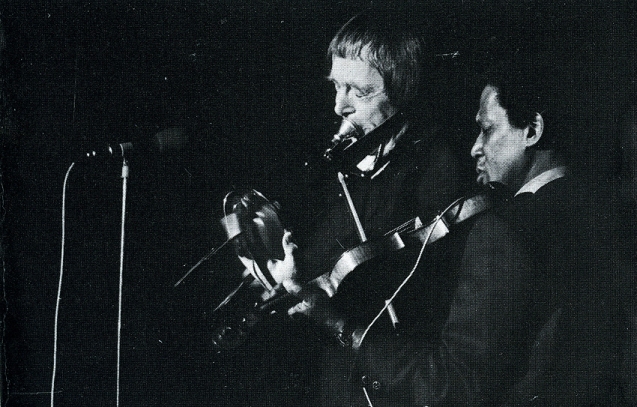 
Professor Alex Bradford (1927 – 1978) was a multi-talented gospel composer, singer, arranger and choir director who was a great influence on artists such as Little Richard, Bob Marley and Ray Charles and who helped bring about the modern mass choir movement in gospel.
Born in Bessemer, Alabama,
he first appeared on stage at age four, then joined a children's gospel
group at thirteen, soon obtaining his own radio show. He organized
another group after his mother sent him to New York City following a racial incident; he continued singing after returning to attend the Snow Hill Institute in Snow Hill, Alabama, where he acquired the title "Professor" while teaching as a student.
He moved to Chicago in 1947, where he worked briefly with Roberta Martin and toured with Mahalia Jackson,
then struck out on his own with his own group, the Bradford Singers,
followed by another group, the Bradford Specials. He recorded his first hit record,
"Too Close To Heaven" (1954), billed as Professor Alex Bradford and his
singers, sold over one million copies, and was awarded a gold disc,[1] then followed it with a number of other successes in the rest of the decade.
Artists such as Little Richard imitated Bradford's energetic style, ranging from a gravelly bass to a whooping falsetto, and his flamboyant stage presence. Ray Charles,
for his part, not only borrowed some of Bradford's vocal mannerisms but
based his Raelets on the Bradford Specials. His 1962 gospel song
composition "Let the Lord Be Seen in Me", recorded for his "One Step
& Angel on Vacation" album, was also recorded in 1964 by an emerging
force in Jamaican music, Bob Marley
& the Spiritual Sisters. Marley later adopted the Rastafarian
faith, but along with his mother, at first he sung gospel in the local
Shilo Apostolic Church.
In 1961, when his recording career was in decline, Bradford joined the cast in "Black Nativity", based on the writings of Langston Hughes. He appeared in Don't Bother Me, I Can't Cope, for which he won the Obie award, in 1972. He died in 1978 as the musical Your Arms Too Short to Box with God was in production. Personnel:
Graham Burbidge (drums)
Chris Barber (trombone)
John Crocker (reeds)
Jackie Flavelle (bass)
Pat Halcox (trumpet)
Johnny McCallum (banjo)
John Slaughter (guitar)
+
Alex Bradford (vocals on 09. - 14.)
Ray Nance (trumpet, violin, vocals on 01. - 08.)
Tracklist:
01.Take The "A" Train(Strayhorn) 5.53
02. I Can´t Give Anything but Love (McHugh/Fields) 4.51
03. Just A-Sittin´ And A-Rockin´(Ellington/Gaines/Strayhorn) 4.29
04. Blues For Yesterday (Nance) 4.35
05. Summertime (I.Gershwin/G.Gershwin) 8.17
06. Oh, Lady Be Good (Gershwin) 5.38
07. When You´re Smiling (Fisher/Goodwin/Shay) 3.22
08. Take The "A" Train (Strayhorn) 0.48
09. Just A Closer Walk With Thee (Traditional) 4.27
10. Lord, Lord You´re Sure Been Good to Me (Traditional) 5.10
11. Introduction by Alex Bradford/Shady Green Pastures (Traditional) 7.44
12. Couldn´t Keep It To Myself (King) 5.13
13. Introduction by Alex Bradford/They Kicked Him Out Of Heaven (Traditional) 5.50
14. Introduction by Alex Bradford/Precious Lord, Take My Hand (Dorsey) 8.30
ARMO 0007 This double-LP was reissued on a Timeless CD, but it is unfortunately no longer commercially available.
Views:
970
|
Added by:
Riffmaster
|
Date:
2011-07-10
|
|
 Wayne Fontana & the Mindbenders
never got the recognition to which they were entitled. Usually pegged
as one-hit wonders in America for "The Game of Love"; as three-hit
wonders in England for "Um Um Um Um Um," "The Game of Love"; and their
sole big hit as a trio (post-Wayne Fontana),
"A Groovy Kind of Love," they had a lot more in them than that meager
run of successes would indicate. As this album reveals, they were a
well-above-average R&B-based British band with their own way of
embracing material as different as the Barry/Greenwich-authored "She's Got the Power," Chuck Berry's "Jaguar and Thunderbird," Curtis Mayfield's
"Girl, You Don't Know Me," and familiar British Invasion single fodder
like "A Certain Girl." They even turned in a gorgeous original, "One
More Time," co-authored by Fontana and Eric Stewart. Fontana
later squandered his reputation in an abortive attempt at a solo
career, but when he was part of the quartet, he had a combination of
power, sincerity, and class that was compelling. They weren't the most
virtuoso band to come out of Manchester, either vocally or
instrumentally, but they could put over a song with enough inspiration
and spirit so that you had to enjoy what they were doing. Every so often
they came up with a flourish in the singing, like on "Too Many Tears,"
"One More Time," and "Cops and Robbers," that comes as a surprise. This
was a brilliant debut album, incorporating new songs and a few remnants
from their early singles and EPs, making up a healthy cross-section of
their sound in 1963 and 1964, which encompassed not only the sounds of Chuck Berry and Bo Diddley, but also the songs of Dave Bartholomew and other New Orleans influences. The only thing missing was a concurrent hit single, their cover of Curtis Mayfield's "Um Um Um Um Um." Wayne Fontana & the Mindbenders
never got the recognition to which they were entitled. Usually pegged
as one-hit wonders in America for "The Game of Love"; as three-hit
wonders in England for "Um Um Um Um Um," "The Game of Love"; and their
sole big hit as a trio (post-Wayne Fontana),
"A Groovy Kind of Love," they had a lot more in them than that meager
run of successes would indicate. As this album reveals, they were a
well-above-average R&B-based British band with their own way of
embracing material as different as the Barry/Greenwich-authored "She's Got the Power," Chuck Berry's "Jaguar and Thunderbird," Curtis Mayfield's
"Girl, You Don't Know Me," and familiar British Invasion single fodder
like "A Certain Girl." They even turned in a gorgeous original, "One
More Time," co-authored by Fontana and Eric Stewart. Fontana
later squandered his reputation in an abortive attempt at a solo
career, but when he was part of the quartet, he had a combination of
power, sincerity, and class that was compelling. They weren't the most
virtuoso band to come out of Manchester, either vocally or
instrumentally, but they could put over a song with enough inspiration
and spirit so that you had to enjoy what they were doing. Every so often
they came up with a flourish in the singing, like on "Too Many Tears,"
"One More Time," and "Cops and Robbers," that comes as a surprise. This
was a brilliant debut album, incorporating new songs and a few remnants
from their early singles and EPs, making up a healthy cross-section of
their sound in 1963 and 1964, which encompassed not only the sounds of Chuck Berry and Bo Diddley, but also the songs of Dave Bartholomew and other New Orleans influences. The only thing missing was a concurrent hit single, their cover of Curtis Mayfield's "Um Um Um Um Um."
Personnel:
Wayne Fontana (vocals, tambourine)
Bob Lang (bass)
Rick Rothwell (drums)
Eric Stewart (guitar, vocals)
Tracklist:01. She´s Got The Power (Greenwich/Powers) 2.17
02. You Don´t Know Me (Walker/Arnold) 2.15
03. Git It (Kelly) 2.47
04. Jaguar And Thunderbird (Berry) 2.04
05. Certain Girl (Neville) 2.45
06. One More Time (Stewart/Ellis) 2.09
07. Where Have You Been ? (Mann/Weil) 2.44
08. Keep Your Hands Off My Baby (Goffin(King) 2.50
09. Too Many Tears 2.09
10. Girl Can´t Help It (Troup) 2.44
11. Cops And Robbers (McDaniel) 3.20
12. I´m Gonna Be A Wheel Someday (Bartholomew/Domino/Hayes) 1.51
ARMU 0006
Views:
717
|
Added by:
Riffmaster
|
Date:
2011-07-10
|
|
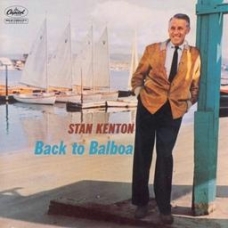 By 1957, the Big Band Era was pretty well over. Fortunately pianist Stan
Kenton never got the message. In fact, he continued to tour with
various aggregations well into the ‘70s, ultimately laying the
groundwork for modern jazz education with school performances and clinics.
While the handwriting may have
been on the wall in the late ‘50s, there was still a large segment of
the listening public that, having grown up on big bands, still loved the
sound of a roaring brass section and tightly arranged saxophones. Stan
Kenton offered them that, with the emphassis on the roaring. Capitol
Records was still very much the purveyer of what could best be termed
"adult popular music,” having not yet struck gold in the teen market with the Beatles and the Beach Boys. The grist for their mill was Frank Sinatra, Nat Cole, and of course, Stan Kenton.
Kenton’s Back to Balboa is the documentation of a brief but unprofitable
residence at the Rendevous Ballroom in Balboa, California in the winter
of ‘57-'58. It shows the band in typical form, with fine arrangements
by Johnny Richards, Marty Paich and Bill Holman. As always, the section
men and soloists are first rate. One need only look at the personnel of
this album to realize the caliber of Kenton’s players. Tenor
saxophonists Bill Perkins and Richie Kamuca and alto saxophonist Lennie Niehaus contribute fine solos, as does trumpeter Sam Noto.
The album is rich in Latin rhythms, with Cuban-themed charts that Kenton
loved to feature. Richards turns "Out of this World” and "Speak Low”
into numbers worthy of old Havana.
A Kenton brass section could not only break glass, it could melt steel
as well. You occasionally get samples of that on this album. In fact, if
you want to hear where trumpeter Maynard Ferguson got the inspiration
for his big bands, you need go no further than his former employer,
Kenton.
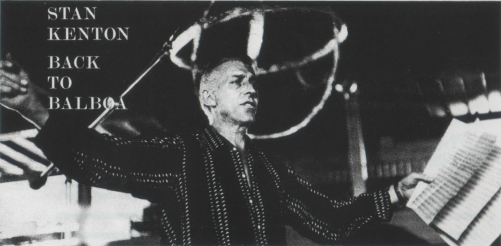
Jim Amlotte (trombone)Bill Catalano (trumpet)Jules Chaiken (trumpet)Jimmy Deckker (french horn)Vincent DeRosa - french horn)Bob Fitzpatrick (trombone)Phil Gilbert (trumpet)Lee Katzman (trumpet)
Richie Kamuca (saxophone)
Joe "Red" Kelly (bass)Stan Kenton (piano)
Kent Larsen (trombone)Archie LeCoQue (trombone)Jerry McKenzie (drums)Stephen Perlow (saxophone)Bill Perkins (saxophone)
Lennie Niehaus (saxophone)
Sam Noto (trumpet)
Don Reed (trombone)
Kenny
Shroyer (trombone)
Tracklist:
01. The Big Chase (Paich) 4.17
02. Rendezvous at Sunset (Richards) 4.17
03. Speak Low (Nash/Weill) 3.28
04. My Old Flame (Coslow/Johnston) 4.02
05. Out of This World (Arlen/Mercer) 5.44
06. Begin the Beguine (Porter) 3.41
07. Get Out of Town (Porter) 2.38
08. Royal Blue (Holman) 5.52
09. I Concentrate on You (Porter) 3.21
10. Beyond the Blue Horizon (Harling/Robin/Whiting) 3.35
11. Two Shades of Autumn (Coccia) 3.54
12. Love Letters (Heyman/Young) 2.26
13. Desiderata (Coccia) 3.11
14. Artistry in Blues (Kenton) 2.45
ARMU 0005
Views:
750
|
Added by:
Riffmaster
|
Date:
2011-07-10
|
|
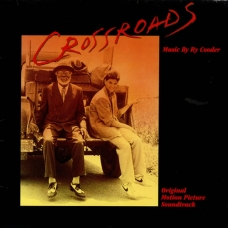 Ryland "Ry" Peter Cooder (born 15 March 1947, in Los Angeles, California) is an American guitarist, singer, and composer. Ryland "Ry" Peter Cooder (born 15 March 1947, in Los Angeles, California) is an American guitarist, singer, and composer.
He is known for his slide guitar
work, his interest in the American roots music, and, more recently, for
his collaborations with traditional musicians from many countries.
Cooder was ranked number 8 on Rolling Stone's "The 100 Greatest
Guitarists of All Time."
This
production of classic blues tunes remains one of my favorites today.
The Karate Kid steps up to the plate but his performance is mediocore
yet saleable. A great story, looking for Robert Johnson's lost tracks, a
rendeveouz with the devil, a young love affair and a quest for
redempetion make this film very likeable.
It is, however, the music that
sets it apart. If you are a fan of R. Johnson a lover of the blues then
it's a must see/listen.
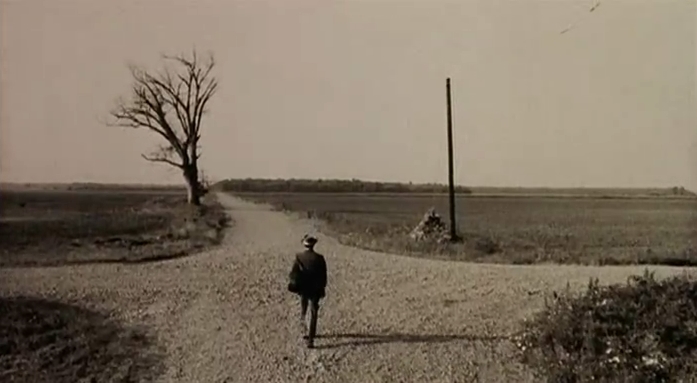
Personnel:
George Bohannon (baritone horn)
Jorge Calderon (bass)
Ry Cooder (guitar, vocals)
Miguel Cruz (percussion)
Jim Dickinson (piano, dolceola)
Nathan East (bass)
Terry Evans (background vocals)
Frank Frost (vocals, harmonica)
Richard Holmes (bass)
Willie Green (background vocals)
Jim Keltner (drums)
Bobby King (background vocals)
John Logan (harmonica)
Amy Madigan (vocals)
Van Dyke Parks (piano)
Alan Pasqua (synthesizer)
John Price (drums)
Joe Senaca (vocals)
Walter Sereth (saxophone)
William Smith (organ)
Otis Taylor (guitar)
Sonny Terry (harmonica)
Tracklist:
01. Crossroads (Johnson) 4.23
02. Down In Mississippi(Lenoir) 4.26 (additional recording - not featured in the movie picture)
03. Cotton Needs Pickin' (Frost/Holmes/Taylor/Price) 2.58
04. Viola Lee Blues (Lewis) 3.11
05. See You In Hell, Blind Boy (Cooder) 2.12
06. Nitty Gritty Mississippi (Burch/Hill) 2.57
07. He Made A Woman Out Of Me (Burch/Hill) 4.12
08. Feelin' Bad Blues (Cooder) 4.17
09. Somebody's Callin' My Name (Traditional) 1.45
10. Willie Brown Blues (Cooder/Seneca) 3.46
11. Walkin' Away Blues (Terry/Cooder) 3.40
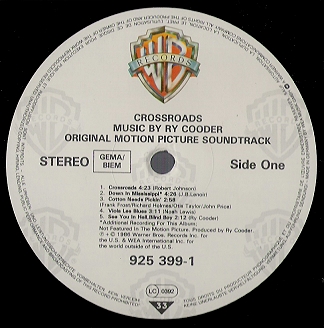
Views:
755
|
Added by:
Riffmaster
|
Date:
2011-07-10
|
| |
|
|
| Entries archive |
|
 |
| Site friends |
Coming soon
|
 |
| Tag Board |
|
|

|


|



